Here’s a clip of N.Y. Times critic A.O. Scott and Richard Roeper going gah-gah for No Country for Old Men. Scott mentions at the end that Josh Brolin shoots a dog in both American Gangster (Denzel Washington‘s) and No Country (a pit bull that has it coming).
wired
“Valkyrie” trailer
A 2 and 1/2 minute trailer for Bryan Singer‘s Valkyrie has been attached to prints of Lions for Lambs that have gone to theatres for debut this Friday. UA spokesperson Dennis Rice says the trailer will have its broadcast debut tomorrow (after being teased tonight) on Access Hollywood and online tomorrow at Yahoo’s trailer site.
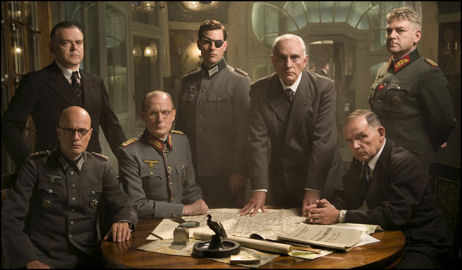
There’s also a Valkyrie featurette on Apple.com today.
In any event, a U.K. projectionist has watched the trailer for the WWII thriller, which concerns a German military plot to assassinate Adolf Hitler with Tom Cruise playing ringleader Col. Claus von Stauffenberg, and say it’s “fairly gripping.” He adds no one in the cast is speaking with a German accent a la Marlon Brando in The Young Lions. “All of the [mostly British] cast members use their own accents,” he says. “Kenneth Branagh sounds English. And Cruise just sounds American, although maybe he’s softened it a bit to sound more English.”
“Atonement”‘s burden has been lifted
“Another theory I’ve been working on is the ‘murder your darlings’ [one] that says that the film everyone thinks is the frontrunner, or the film a publicist or studio tries to position as the frontrunner, is the one that is doomed to lose the big prize,” Awards Daily‘s Sasha Stone wrote earlier today.

Wildebeest herd in Masai Mara National Reserve, Kenya
“Murder your darlings — if you want a movie to win best pic, don’t position it as the frontrunner going into Oscar season unless it’s Schindler’s List, Titanic or Return of the King.”
In other words, Atonement — seen in some quarters as a kind of front-runner (i.e., not precisely “the” front-runner but a close approximation) from the end of the Toronto Film Festival until late October — is either slipping or slipped. Which is fine because now it doesn’t have to shoulder any kind of pseudo-front-runner status. Now it can kick back and gallop along with the rest of the panting wildebeests making their way across the plains of Kenya. But watch out for those lions!
Karaszewski’s red T-shirt
Variety‘s Dave McNary wrote this morning about screenwriter Larry Karaszewski (The People Vs. Larry Flynt, Ed Wood) having “made a major fashion statement” outside Paramount Studios with a red T-shirt emblazoned with a reprint of a recent LA Times story headlined: “Viacom profit shoots up 80%.”

Fine, very clever, typical Karaszewski move . But why didn’t McNary’s story have a photo of Karaszewski’s actual T-shirt (i.e., with Karaszewksi wearing it) instead of a fake Photoshop simulation, and a simulation of a female T-shirt at that? If Karaszewski writes or calls, I’ll meet him tomorrow (or whenever) down at the Paramount gate with my camera and I’ll show Dave McNary how it’s done.
Nobody cares about Roberts’ beef
I don’t care that the real Richie Roberts has accuracy beefs with American Gangster. I’m glad Ridley Scott and Steve Zallian made stuff up…good! Russell Crowe plays the former detective in Scott’s film. Two days ago Roberts told N.Y. Post writer Susannah Cahalan that the film “whitewashes” the facts about former Harlem drug kingpin Frank Lucas and misrepresents aspects of Roberts’ life. Fine!
Denzel’s “Debaters”
No surprise that the trailer for Denzel Washington‘s The Great Debaters (Weinstein Co., 12.25) is smart, engaging, and clearly presented. Since there’s no question about Washington (Antwone Fisher) being an above-average director it’ll be no surprise if it turns out to be a good or exceptional film.
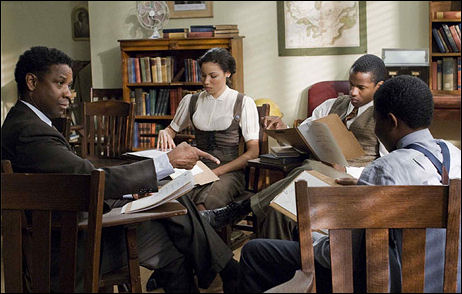
But let’s be honest and admit it’ll be a surprise if this inspirational true-life story delivers any surprises. We all know the inspirational movie template. We’ve seen these films time and again (i.e., gifted teacher inspires underdogs to think and perform like winners, resulting in a third-act competition against a heavily-favored championship team), and we all know how they play. But I want to see it anyway. Washington obviously knows about the familiarity syndrome, and you have to figure he’s done one or two things differently.
The only present-tense surprise is that there’s a Great Debaters website, which is virtually unheard of for a Weinstein Co. release. I’m guessing Washington paid for it himself.
Back to Los Angeles
Catching a 2 pm plane back to Los Angeles. Back on it sometime late this evening, I suppose.
Jones = narrator, Greek chorus
With the exception of four or five X-factor types, every person I spoke to at the No Country for Old Men premiere party on Sunday night said they loved it and called it beautifully made and superbly acted and all, but 90% also said “except for the ending, which I’m not sure about.”

That’s it, I said to myself. If supposedly hip industry types are saying this over and over, it’s inescapable. It’s going to be a huge refrain among the heartland ticket-buyers when No Country opens on 11.21.
The discomfort boils down to a certain level of passivity and inactivity on the part of the good-guy lawman played by Tommy Lee Jones. (That’s keeping things vague enough, I think.) And so I’ve come up with a way to process this so viewers won’t necessarily have this problem when they see it. And all you have to do to understand is to be vaguely familiar with Thornton Wilder‘s “Our Town.”
Jones sheriff character (his full name is “Ed Tom Bell”) has more or less the same function as the narrator in “Our Town.” Nobody complains about the narrator not falling in love or dying or being outside the action of “Our Town” when they see the play, and so nobody should complain about Jones’ character doing the same. He’s a Greek chorus. Is everyone getting this?
Yes, he’s a character in the film — standing around and sizing things up and signing checks and talking to this and that person (including his beautiful wife, played by Tess Harper) and riding a horse in one scene — but he’s not in the story. Period. So no bitching when he doesn’t do the righteous manly sheriff thing at the end of the film because that’s not the deal.
Van Airsdale on WGA strikers
The Reeler’s Stu Van Airsdale has done some reporting on the WGA picket line in Manhattan. He got some fairly good quotes from Peter Hedges, Scott Coffey, Adam Brooks, etc. He meant to send it along earlier but, he says, “it’s still pretty fresh.”
Pete & Angie 2
I chose to attend Sunday night’s No Country for Old Men premiere and after-party rather than attend the Mighty Heart screening and Angelina Jolie q & a that happened at the same time at Paramount studios. I wish I could’ve done both because I respect Jolie’s performance as Mariane Pearl, the widow of murdered Wall Street Journal reporter Daniel Pearl, and would have liked to take it in again.

Roughly 450 people attended, according to a Paramount publicist who wrote me about it yesterday. The q & a between Jolie and Maxim critic and Envelope columnist Pete Hammond ended with a standing ovation. Angelina joined the after-reception and did the old schmooze-around.
Hammond handled the questions in his usual smooth way, she said. And yet Hammond told me later on he briefly had one of those mild freakouts that everyone has from time to time when interviewing a celebrity in front of a big crowd when you “go up” the way actors do when they forget their lines. These things happen to the best of ’em. I’ve been there. You’re trying to listen to what the actor or actress is saying, and at the same time unable to figure your next question.
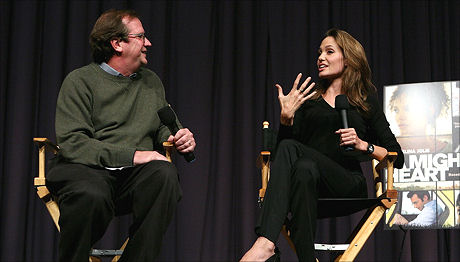
The discussion was on the candid side. Jolie was “emotional and sometime teary-eyed as she shared details of her relationship with Mariane and the pressure of all those involved with the film that the movie tried to honor,” the publicist wrote. “She spoke of the improvisational-style on the set and shared that the climatic, emotional scene in which Mariane hears of Daniel’s fate was the first take and all the actors were crying as it happened.”
Sounds of “Blood”
Some were cold or indifferent to it, but most of the viewers I spoke to after last night’s Castro theatre screening of There Will Be Blood were either very approving or admitted to having been powerfully moved. Consider the cheers and applause that greeted the closing credits. Here‘s my final interview of the night with a huge fan. And here‘s a longish recording of several people offering various reactions. (Sorry for the ambient wallah-wallah, which makes it difficult to hear some of what’s being said.)
“There Will Be Blood” review
Paul Thomas Anderson‘s There Will Be Blood is one of those legendary, go-for-broke, fiercely psychological big-canvas art movies that you need to see twice — the first time to go “whoa!” and recoil and get all shaken up and bothered about, and the second time so you can reconsider and see what a masterwork it is, despite your feelings about the malignant emotional content. If you’re a film maven of any kind you can’t let your piddly emotions get in the way of recognizing diseased greatness.
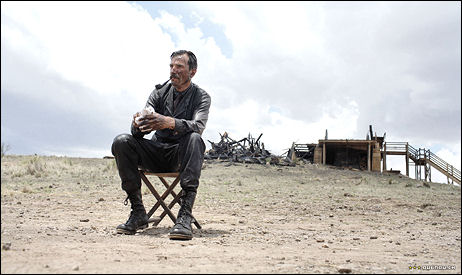
Daniel Day Lewis‘s portrayal of the remarkable Daniel Plainview — a driven, increasingly manic and misanthropic oilman who builds an empire in the early 20th Century — is historic. It’s one of the most riveting and demonically possessed performances ever put to film — more feverish than any monster played by Lon Chaney or Boris Karloff or Bela Lugosi — and yet human and vulnerable-seem- ing enough to stir a certain recognition. He’s playing John Huston, after all, by way of Noah Cross. Or is it vice versa?.
Plainvew is a Count Dracula who spews oil rather than sucks blood. He’s starts out as a hard-working miner, then a tough businessman, then a religion-hating misanthrope, then a father who abandons his son, and finally a full-out fiend.
Lewis has a Best Actor Oscar nomination in the bag, of course, but the moral matter of what he and Anderson have brought into the world may give pause to some.
I’m imagining Anderson and Lewis holding a miniature infant version of Daniel Plainview in baby blankets, fresh out of the womb and wet with afterbirth and yet adultly proportioned (as he is in the film), and saying to us all, “Come see our child! He’s a monster, no question, but he came from our ribs and our souls and we love him…God help us but we do. We realize you can’t love him — he’s not constructed that way — but can you respect him at least? Can you at least see that he’s where some of us — perhaps more than a few of us — have come from? Or is a person that, God help us, some of us may actually be?”
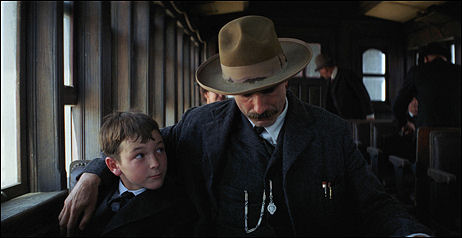
No one in the world will argue that the musical score by Radiohead’s Jonny Greenwood isn’t a major mind-bender. It’s boldly intrusive, brassy and manic, pushy, crazy-man symphonic. It expresses Plainview’s psychological state, of course, but it’s also a character unto itself. It keeps saying “listen to me…no, no, listen to me!” And you do, and you can’t help but think and think about it afterward. It’s a guaranteed Oscar nominee.
I really don’t know what to say about Blood‘s chances of being Oscar-nominated for Best Film, or Anderson’s for Best Film or Adapted Screenplay (based as it is on Upton Sinclair‘s “Oil!”). My first reaction was that it’s too cold for the Academy types to embrace it, but I’m starting to wonder. I really don’t know if my first reac- tion is the one to trust or the reaction I’m feeling now, having seen it a second time last night at San Francisco’s Castro theatre with a huge crowd, and admired it all the more.
“Does it have a chance of being named Best Picture by a critics group?,” I wrote a week and a half ago. “Conceivably. Does it have a chance in hell of being nominated for Best Picture by the Academy? I really doubt this. A film this black and misanthropic has never played with the Academy. Compared to Anderson’s film, No County for Old Men is a fairly gentle and kind-hearted thing, at least in terms of Tommy Lee Jones‘ lawman character.
I was wowed but mixed after seeing There Will Be Blood on 10.25. There was no question I’d just seen a masterfully well-honed psychodrama about a two-pronged figure — a snarly, self-made oil tycoon and a creature from the black lagoon — in early 20th Century California.
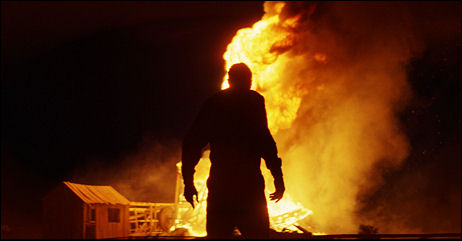
I also knew this was a powerfully convincing portrait of what a rough, backbreaking thing it was to get oil out of the ground 80 and 90 years ago, and a seriously strange but fascinating look at the primal influences of big oil and evangelical Christianity — religions that obviously still prosper today.
It was also clear there was a strong, somewhat plagued psychological engine at its center. I’m speaking principally of Anderson’s sardonic, dark-leaning world view (portions of Punch Drunk Love aside) and, I strongly suspect, his feelings about his late father, big-time announcer Ernie Anderson, who was allegedly a fierce personality with very dark leanings himself.
People are going to be talking about There Will Be Blood‘s closing line — “I’m finished” — for a long time to come. As well as those first 15 or 20 minutes of dialogue-free story-telling and atmosphere absorption. It’s obviously a work of a first-rate filmmaker delivering a very high-end art epic, at times stunningly so.
There is nothing but realism in There Will be Blood — there isn’t a fake line or moment in the entire 2 hours and 38 minutes — but it’s also an embodiment of a very creepy psychology. Black as night, black as oil, blacker than the bottom of a sealed-up well. My girlfriend hated it. The thought occured to me during the first screening that it’s probably going to make as much as The Assassination of Jesse James…if that.
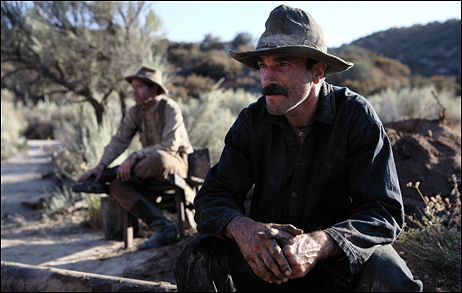
I respect this film enormously. I admire each and every part. But it leaves you with nothing but the taste of bile in your mouth at the end. Bile and ashes that you want to spit on the pavement as you’re heading out to the parking lot, and at the same time you want to keep with you because they came from a strong and penetrating film.
The day after first seeing it I wrote that Anderson “has a heart of darkness inside him that would make Joseph Conrad tremble and turn pale. I don’t know anything, but There Will Be Blood doesn’t seem like a movie for audiences to watch and delight in as much as a therapy session for Paul to work out his rage and anger at Ernie.”
Lewis’s “Bill the Butcher” in Gangs of New York was a grand guignol psychopath, but Plainview is even more diseased as he lets no light in whatsoever. No gentleness, humor or warmth (except for the love he shows his young adopted son during the first hour). A shrewd survivor, but consumed by utter greed and calculation. A man looking for love and loyalty, and yet ready to kill or abandon those he feels have betrayed him or let him down. Not a character as much as a kind of demonic force of nature.
A week and a half ago I wrote “there is no way — no way in hell — that rank-and-file Academy members are going to embrace this performance, forceful and amazingly intense as it is, enough for Lewis to win. I support his being nominated because I know what great acting is, but no way in hell does he win. Forget it.” Now I don’t know. Last night’s viewing turned me around somewhat. I feel less emotional and more sure of the greatness at work here.
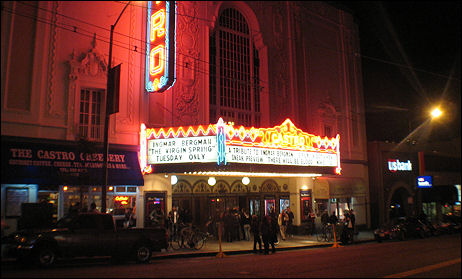
Castro Theatre marquee — Monday, 11.5.07, 6:50 pm
Within its own heavily male, oil-soaked, organized religion-hating, misanthropic realm, There Will Be Blood is brilliant.
But (and I’m talking about the first viewing, not the second) it’s about as hateful as a quality film can be — hateful in that there’s no one to care about except for the young son (and his adult incarnation at the end), and not that much to think about. Most women viewers will probably despise it, and yet it’s easily one of the year’s best made films.
I haven’t mentioned the fall-on-your-knees quality of Robert Elswit‘s widescreen cinematography or Jack Fisk’s production design. I’ll get into the other fine performances by Paul Dano, Ciaran Hinds, Dillon Freasier and Kevin J. O’Connor down the road. It’s primarily a Lewis show from start to finish, and it’s hard to focus elsewhere for the time being.
Anderson is saying, I think, “Don’t let yourself be like this guy….but if you are like this guy, don’t turn to religion to cure your ills because God is a foolish superstition, and religions are run by money-grubbing hypocrites.”
There Will Be Blood is a cautionary tale — beware of the Daniel Plainviews in your life, and the ones living inside you. Is it worth two hours and 38 minutes of experiencing a seething misanthropic cauldron to absorb this message? Yes, it’s worth it…definitely. It passes along a kind of insanity, but it does so with absolute greatness.
